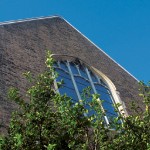 When I was hired by the Law School in October, I joked that my basketball affections were for sale – Go, Golden Eagles – but, especially when I was writing in my own reporting voice, I didn’t expect to change my journalistic standards (there really are such things) after more than 35 years of newspapering in Milwaukee. So if you want to consider this hopeless pandering to my bosses, I can’t stop you. But I regard this as just a blog item in my voice.
When I was hired by the Law School in October, I joked that my basketball affections were for sale – Go, Golden Eagles – but, especially when I was writing in my own reporting voice, I didn’t expect to change my journalistic standards (there really are such things) after more than 35 years of newspapering in Milwaukee. So if you want to consider this hopeless pandering to my bosses, I can’t stop you. But I regard this as just a blog item in my voice.
The annual Law School Public Service Conference was this past Friday at the Alumni Memorial Union, with a theme of “Water and People.” It’s one of the centerpieces of the Law School’s involvement in public issues and its commitment to promoting knowledge of and involvement in those issues.
But I’ve been impressed in the four months I’ve been hanging around the building with how strong the public service environment is in the Law School and with how little of the reason for saying this is rooted in once-a-year events. Consider a partial list:
The Milwaukee Volunteer Legal Clinic, which brings legal services by lawyers and law students to low-income people at four clinics in Milwaukee. A set of alternative dispute resolution programs involving both adults and youths, especially restorative justice programs in Milwaukee schools. A central role in the Milwaukee Safe Streets Initiative. The Milwaukee Foreclosure Mediation Program. The Marquette Legal Initiative for Nonprofit Corporations. A variety of other pro bono efforts by students, both in Milwaukee and well beyond.
Altogether, efforts such as these create an environment, within the community of the Law School, that expects public service. The big events, like the water conference, are significant and substantial, but they occur in that broader context.
That was the theme when Dean Joseph D. Kearney spoke recently to a Downtown Rotary Club luncheon. “Marquette University Law School is, increasingly, an important civic institution,” Kearney said. He said it was increasingly clear that the Law School serves Jesuit and Marquette University missions of developing men and women to serve others.
Kearney said the Law School has a long record of serving people of many religious backgrounds, and he pointed out that, of the five African-American circuit judges in Milwaukee County, four are graduates of the Law School.
Kearney said, “The Law School should be a common ground” for people with differing views to come together to talk about policy and issues, and he has led a build-up of efforts of that kind. One example of doing that effectively is the role the Law School has had in promoting serious discussion about the Wisconsin Supreme Court. “More than ever, we need such common ground,” he said.
He also pointed to the “On the Issues” series, hosted by Mike Gousha. The series has brought political leaders, newsmakers, authors, and others who are involved in public issues to the Law School for conversations that are open to the public and that increase the connection between the school and the community at large.
The drive to increase the Law School’s involvement in public service began under the late Dean Howard Eisenberg, and Kearney has pursued the goal vigorously.
Obviously, I do have a conflict of interest in commenting on this. The creation of the position I have – senior fellow in law and public policy – was part of the Law School’s vision of how to increase its role in furthering community discussion and awareness of issues. I’m fortunate to have the job and I hope, over time, to show that it is a public service.
If I succeed, that will make me only part of a much larger and energetic sense of public service here.
